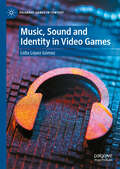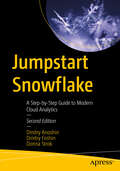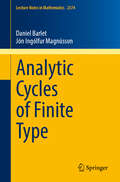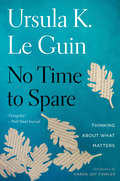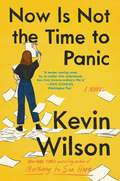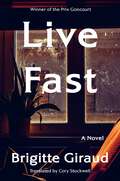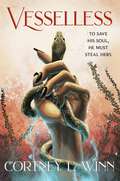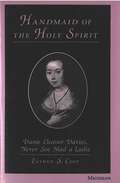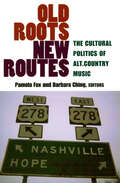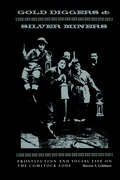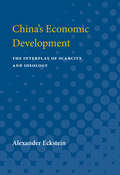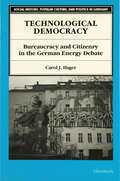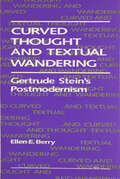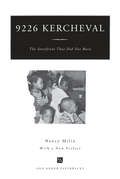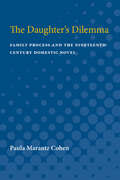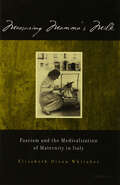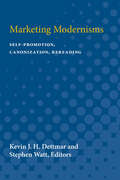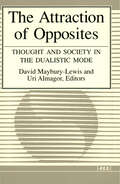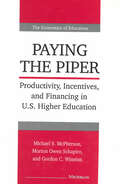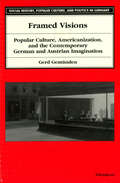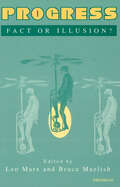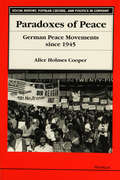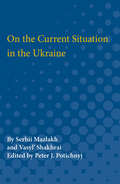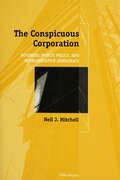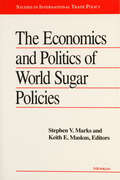- Table View
- List View
Music, Sound and Identity in Video Games (Palgrave Games in Context)
by Lidia López GómezThis book offers a comprehensive overview of how video game sound and music represent cultures, spaces and personal identifications. Focusing on the concept of identity, the volume brings together issues as diverse as belonging to an ethnic or cultural group, identifying with certain sexualities or being able to deduce the historical or geographical context of a game. This volume explores whether the musical and sound identities linked to video games are based on clichés and stereotyped arrangements that span cultures and times. It includes case studies that analyse the mechanisms used by game producers, composers and sound designers to &“characterise&” and represent different identities to broad audiences of potential players, as well as how the players perceive these sonic inputs. The book is organized into three main sections, covering topics as the representation of historical periods, musical stereotypes of cultures from different geographic locations, representations of identity in fictional spaces and sonic depictions gender.
Jumpstart Snowflake: A Step-by-Step Guide to Modern Cloud Analytics
by Dmitry Anoshin Donna Strok Dmitry FoshinThis book is your guide to the modern market of data analytics platforms and the benefits of using Snowflake, the data warehouse built for the cloud. As organizations increasingly rely on modern cloud data platforms, the core of any analytics framework—the data warehouse—is more important than ever. This updated 2nd edition ensures you are ready to make the most of the industry&’s leading data warehouse. This book will onboard you to Snowflake and present best practices for deploying and using the Snowflake data warehouse. The book also covers modern analytics architecture, integration with leading analytics software such as Matillion ETL, Tableau, and Databricks, and migration scenarios for on-premises legacy data warehouses. This new edition includes expanded coverage of SnowPark for developing complex data applications, an introduction to managing large datasets with Apache Iceberg tables, and instructions for creating interactive data applications using Streamlit, ensuring readers are equipped with the latest advancements in Snowflake's capabilities. What You Will Learn Master key functionalities of Snowflake Set up security and access with cluster Bulk load data into Snowflake using the COPY command Migrate from a legacy data warehouse to Snowflake Integrate the Snowflake data platform with modern business intelligence (BI) and data integration tools Manage large datasets with Apache Iceberg Tables Implement continuous data loading with Snowpipe and Dynamic Tables Who This Book Is For Data professionals, business analysts, IT administrators, and existing or potential Snowflake users
Analytic Cycles of Finite Type (Lecture Notes in Mathematics #2374)
by Daniel Barlet Jón Ingólfur MagnússonThis book highlights the use of non-compact analytic cycles in complex geometry. The main focus is on analytic families of cycles of finite type, in other words, cycles which have only finitely many irreducible components. It is shown how the space of all cycles of finite type in a given complex space, endowed with a weak analytic structure, can be used in many ways as the reduced complex space of all compact cycles in the given space. Several illustrative and enlightening examples are provided, as well as applications, giving life to the theory. The exposition includes a characterization of quasi-proper holomorphic maps which admit a geometric flattening, a proof of an existence theorem for meromorphic quotients with respect to a large class of analytic equivalence relations, and a generalization of the Stein factorization to a variety of holomorphic maps. In addition, a study is made of the behavior of analytic families of finite type cycles when they are restricted to Zariski open subsets and extended across analytic subsets. Aimed at researchers and graduate students with an interest in complex or algebraic geometry, the book is adequately self-contained, the basic notions are explained and suitable references are given for auxiliary results that are used in the text.
No Time To Spare: Thinking About What Matters
by Ursula K. Le GuinFrom acclaimed author Ursula K. Le Guin, a collection of thoughts—always adroit, often acerbic—on aging, belief, the state of literature, and the state of the nation.Ursula K. Le Guin on the absurdity of denying your age: “If I’m ninety and believe I’m forty-five, I’m headed for a very bad time trying to get out of the bathtub.”On cultural perceptions of fantasy: “The direction of escape is toward freedom. So what is ‘escapism’ an accusation of?”On breakfast: “Eating an egg from the shell takes not only practice, but resolution, even courage, possibly willingness to commit crime.”Ursula K. Le Guin took readers to imaginary worlds for decades. In the last great frontier of life, old age, she explored a new literary territory: the blog, a forum where she shined. The collected best of Ursula’s blog, No Time to Spare presents perfectly crystallized dispatches on what mattered to her late in life, her concerns with the world, and her wonder at it: “How rich we are in knowledge, and in all that lies around us yet to learn. Billionaires, all of us.”“The pages sparkle with lines that make a reader glance up, searching for an available ear with which to share them.” — Melissa Febos, New York Times Book Review“Witty . . . deeply observed.” — USA Today “A book that truly does matter.” — Houston Chronicle
Now Is Not the Time to Panic: A Novel
by Kevin WilsonNATIONAL BESTSELLERNamed a Best Book of the Year by: Time * Kirkus Reviews * USA Today * Entertainment Weekly * Garden & Gun * Vox * Atlanta Journal-ConstitutionA Most Anticipated Book of Fall from: Associated Press * Atlanta Journal-Constitution * BookPage * Book Riot * The Boston Globe * Entertainment Weekly * Esquire * Garden & Gun * LitHub * St. Louis Post-Dispatch * Sunset Magazine * Time * Town & Country * The Millions * USA Today * Vogue * Vulture * The WeekAn exuberant, bighearted novel about two teenage misfits who spectacularly collide one fateful summer, and the art they make that changes their lives foreverSixteen-year-old Frankie Budge—aspiring writer, indifferent student, offbeat loner—is determined to make it through yet another summer in Coalfield, Tennessee, when she meets Zeke, a talented artist who has just moved into his grandmother’s house and who is as awkward as Frankie is. Romantic and creative sparks begin to fly, and when the two jointly make an unsigned poster, shot through with an enigmatic phrase, it becomes unforgettable to anyone who sees it. The edge is a shantytown filled with gold seekers. We are fugitives, and the law is skinny with hunger for us.When the posters begin appearing everywhere, people wonder who is behind them and start to panic. Satanists? Kidnappers? The rumors won’t stop, and soon the mystery has dangerous repercussions that spread far beyond the town.Twenty years later, Frances Eleanor Budge gets a call that threatens to upend her carefully built life: a journalist named Mazzy Brower is writing a story about the Coalfield Panic of 1996. Might Frances know something about that?A bold coming-of-age story, written with Kevin Wilson’s trademark wit and blazing prose, Now Is Not the Time to Panic is a nuanced exploration of young love, identity, and the power of art. It’s also about the secrets that haunt us—and, ultimately, what the truth will set free.
Live Fast: A Novel
by Brigitte GiraudWinner of the Prix Goncourt A powerful autobiographical novel of loss, the incandescent love that remains, and the small decisions that define the course of fatePaced and structured with the inevitable suspense of a countdown, Brigitte Giraud’s tense and haunting novel follows one woman’s quest to comprehend the motorcycle accident that took the life of her partner Claude at age 41.The narrator of Live Fast recounts the chain of events that led up to the fateful accident, tracing the tiny, maddening twists of fate that might have prevented its tragic outcome. Each chapter asks the rhetorical question, “what if,” departing from an image or memory from early years in Algeria during the war, to moving to the suburbs of Lyon, buying and renovating a home where they could “put down their suitcase for a whole life.” A sensitive elegy to her husband and a subtle, precise vision of a lasting love, Live Fast is a moving and electrifying portrait of two people caught up in the mundane activities of life, forgetting that living itself can be dangerous.
Vesselless: A Novel (The Merciless Realms #1)
by Cortney L. WinnCortney L. Winn’s sensational debut Vesselless is an addictive enemies-to-lovers romance following the heir to a fantasy kingdom, and the seductive spirit sent to claim her soul—perfect for fans of Rebecca Yarros and Carissa Broadbent.“I’ve seen monsters, Nizzara, and you are not one of them. A little beast maybe, but not a monster.”Nizzara, reluctant heir to the Kingdom of Zarr, has always been able to perceive spirits better than the average caster. When she enters a deadly tournament to escape her betrothal, she's determined to win without succumbing to the addictive spirit magic she channels, or the unnerving darkness growing within her. But finding herself outmatched, Nizzara must face her fear of power and team up with Dagen—an enemy who is half-ghost and all charm—to survive the tournament.Dagen, the last King of Zarr, was killed by Nizzara’s father ten years ago. Now a half-ghost—able to phase between his human and spirit form—he is stuck in another realm, hunting wretched souls for the god of death. When his keeper offers him a chance to reclaim his freedom in exchange for Nizzara’s soul, Dagen takes the deal.There’s only one catch: she must give it to him freely by the tournament’s end, or his own soul is forfeit.Perfect for fans of Fourth Wing and The Serpent and the Wings of Night, Vesselless is a spellbinding fantasy of magic and intrigue — and a tantalizing slow burn that will have you hooked until the very last page.
Handmaid of the Holy Spirit: Dame Eleanor Davies, Never Soe Mad a Ladie
by Esther S. CopeOn the morning of July 28, 1625, Dame Eleanor Davis (1590-1652) heard "a great voice from heaven" tell her "There is Nintene years and a halfe to the day of Judgement and you as the meek Virgin." She believed the message came from the prophet Daniel and began immediately to explain how the books of Daniel and Revelation applied to England's history. In the next twenty-seven years, she wrote more than sixty religious and political tracts addressed to the king, the Parliament, and the public. Filled with anagrams, puns, and carefully contrived literary imagery, these tracts offered a devastating critique of the patriarchal society in which Eleanor Davies lived. Handmaid of the Holy Spirit draws upon a rich array of primary documents and provides scholars of history, literature, and religion a basis for reevaluating their conclusions about seventeenth-century England. Nonspecialists will also find the dramatic story of the fascinating and eccentric Lady Eleanor Davies compelling reading.
Old Roots, New Routes: The Cultural Politics of Alt.Country Music
by Barbara Ching Pamela FoxOld Roots, New Routes takes an in-depth look at the many influences, meanings, and identities of this contemporary music form. Because the definition of the term alt.country changes continually, even the genre's own mouthpiece, the Web site nodepression.com, declared its terrain to be "alternative country (whatever that is)." Despite alt.country's murky parameters, its origins, indeed, its patron saints, are generally acknowledged to range from the Carter Family and Hank Williams---as interpreters of traditional American country---to the country-rock fusions of Gram Parsons and Steve Earle. Just as other musical genres before it have distanced themselves from the popular and commercial center, from the start alt.country has positioned itself as a different kind of music than the slick country sounds emanating from Nashville hit machines such as Garth Brooks and Shania Twain. And yet alt.country's embrace of authenticity and disdain for commercialism---while simultaneously injecting into a traditional, working-class music form an often cosmopolitan flavor and "Generation X" values---has resulted in a fascinating hybrid full of contradictions. In Old Roots, New Routes, Pamela Fox and Barbara Ching bring together a range of scholars to investigate as never before this significant contemporary music form, providing in addition new ways to approach the worlds of country and alternative music more generally. Individual essays explore the work of a variety of artists, including Neko Case, Jay Farrar, Justin Treviño, and alt.country "hero" Gram Parsons, along with promotional rhetoric, album art, advertising, and fan Web sites, to offer readers a comprehensive understanding of how alt.country functions as a distinct musical form. Pamela Fox is Associate Professor of English and currently the Director of the Women's and Gender Studies Program at Georgetown University. She is the author of Class Fictions: Shame and Resistance in the British Working-Class Novel, 1890–1945. Barbara Ching is Associate Professor at the University of Memphis. Her previous books include Wrong's What I Do Best: Hard Country Music and Contemporary Culture and Knowing Your Place: Rural Identity and Cultural Hierarchy, coedited with Gerald Creed.
Gold Diggers and Silver Miners: Prostitution and Social Life on the Comstock Lode (Women And Culture Series)
by Marion S. GoldmanIn 1859 high grade silver bullion was discovered on the Comstock Lode. In a twinkling, Virginia City was transformed into a brawling boom town perched on a mountain of silver. Twenty years later it virtually disappeared, leaving behind played-out mines, tumbled-down shanties, and memories of those who sought their fortunes on the lode. The fortune seekers were many: miners and madams, confidence men and dance hall girls. The fast life was as stratified as any proper community, ranging from expensively kept women to prostitutes living in cribs. Laura Fair, an elite member of the demimonde, shot her protector and, after a spectacular trial, retired to live modestly in San Francisco. Jessie Lester made a small fortune as a madam while middle rank prostitutes such as Julia Bulette died in debt. At the lowest end of scale were "celestial damsels," nameless slave women brought from China to minister to the needs of Chinese workers. Chronicling it all was the cynical and lascivious pen of Alf Doten, writer, editor, and bon vivant. In Gold Diggers and Silver Miners, sociologist Marion S. Goldman provides a detailed account of prostitution on the Comstock Lode. By considering sexual commerce in a community limited in space and time, she explores general relationships between prostitution and society, shedding light on sociological questions of importance today.
China's Economic Development: The Interplay of Scarcity and Ideology (Michigan Studies On China)
by Alexander EcksteinChina's Economic Development: The Interplay of Scarcity and Ideology by Alexander Eckstein provides a comprehensive analysis of China's economic growth and transformation from a socialist economy. Eckstein examines the unique challenges China faced in addressing its economic backwardness, such as scarcity of resources and ideological constraints, and compares its industrialization to other countries. The book explores how Maoist ideology and policy initiatives impacted the country's economic strategies, leading to a fluctuating development pattern characterized by rapid expansion in the 1950s and stagnation in the 1960s. Key themes include the dichotomy between scarcity and ideology, the influence of historical factors on economic structures, and the adaptation to Soviet models. Eckstein sheds light on how China navigated its unique size, population pressures, and low per capita income, arguing that understanding these dynamics is crucial for both development theory and policy design. This volume, part of the Michigan Studies on China series, compiles essays and research that contribute to a nuanced understanding of China's economic systems, with particular focus on the tensions between ideological aspirations and economic realities.
Technological Democracy: Bureaucracy and Citizenry in the German Energy Debate (Social History, Popular Culture, And Politics In Germany)
by Carol J. HagerWhat are the prospects for democratic participation in the modern technological state? Is technology a force of emancipation or enslavement? Intellectuals such as Max Weber have prophesied that complex issues would ultimately be decided by technical experts instead of by those who were affected or their political representatives—and that politics would give way to technocracy. Technological Democracy explores the connection between environmental and democratizing concerns in Germany, to see what answers environmental groups might provide to the question of the citizen's role in a technological society. The volume explores the ways in which lay citizens can participate in policy decisions of a technical nature, and whether in doing so they can repoliticize and democratize those policy areas that have become the territory of experts. Technological Democracy will be of interest to scholars and students in German history, political science, and sociology.
Curved Thought and Textual Wandering: Gertrude Stein's Postmodernism
by Ellen E. BerryThis wide-ranging and provocative study traces Gertrude Stein's production of avant-garde texts that radically disrupted traditional notions of how fiction should be defined, valued, and read. The book combines feminist and postmodern perspectives to illuminate new facets of Stein’s novels and to situate them within an expanded definition of the postmodern. The author argues that if we fail to consider the contexts within which postmodern innovations occur, and if we subsume all formal disruptions under a generalized postmodern mode, we obscure important differences among authors and distort the notion of the postmodern itself.The study expands our understanding of Stein as a novelist and a narrative theorist, repositions her work within a revised notion of literary history, and thus clarifies points of relation and divergence between modernism and postmodernism. It also assists in the historicizing of the postmodern literary emergence by insisting on the centrality of gender as a category of analysis. Finally, it argues for the importance of constructing definitions of postmodernism that will allow space to consider the complexity and diversity of its cultural practices. Curved Thought and Textual Wandering will be welcomed by scholars of modernism, of Gertrude Stein, and of feminist and narrative theory and postmodern culture.
9226 Kercheval: The Storefront that Did Not Burn, With a New Preface (Ann Arbor Paperbacks)
by Nancy Milio"They make you feel like you're somebody..." The testimony of one black woman in Detroit's Lower Southeast Side ghetto, explaining what the storefront at 9226 Kercheval Street means to her. The storefront houses the Mom and Tots Neighborhood Center—a remarkable experiment in community health care, founded by a diminutive registered nurse named Nancy Milio and run by and for the people of the ghetto. This is the area that was literally burned down during the Detroit Riot of 1967. Not a proper location for a maternity and daycare center, according to many white professionals."These people ought to go away from their neighborhood so they can see how other people live... if we make it too easy for them, they'll never..."During the Riot, buildings on both sides of the Mom and Tots Center were fired and gutted. The Center was untouched. Why it was untouched is one of the implicit themes of 9226 Kercheval; as is the theme of struggle—struggle in the birth and development of a truly relevant health-care center, and struggle to define "health" in its broadest possible terms."Health is... opening, unfolding, from diffuseness towards coherence, simplicity toward complexity... toward wholeness."9226 Kercheval is both a documentary of how a new institution grew and a personal account of how a "social activist" was herself changed. It is the story—beautifully conceived and written—of the strengths of the so-called people of poverty. There is no other book like it.
The Daughter's Dilemma: Family Process and the Nineteenth-Century Domestic Novel
by Paula Marantz CohenThe Daughter's Dilemma breaks new ground in literary studies through its application of family systems theory to the analysis of nineteenth-century domestic novels. Cohen argues for structural correspondences between families and novels: as systems seeking closure, they are governed by certain analogous laws. She argues further that the father-daughter dyad is the pivotal structure by which the nuclear family and the domestic novel were able to define themselves as closed systems. The study treats novels by Samuel Richardson, Jane Austen. Emily Bronte, George Eliot, and Henry James and places them in the context of the writers' individual family experiences. Drawing on recent work in literary and feminist criticism, anthropology, history, and psychoanalysis. as well as family systems theory, Cohen seeks to critique the limitations of these theoretical models even as she employs them lo illuminate the texts under discussion. The study's approach leads to insights about the contemporary family and about the present state of literature and literary criticism. Cohen concludes by suggesting that the modern period marked the demise of an ideology favoring closed systems. The result has been both a nostalgia for those systems and a redefinition of experience and relationship as open and subject to endless interpretation. Such an ideological reformulation helps explain the present insistence by literary theorists on the inescapability of the text and the "reality" of representation.
Measuring Mamma's Milk: Fascism and the Medicalization of Maternity in Italy
by Elizabeth Dixon WhitakerIn Italy as in other Western societies, the medicalization of basic biological functions contributes to the loss of personal confidence in the care of the body. Measuring Mamma's Milk analyzes the medicalization of maternity through a study of breastfeeding practices over a century of changes in socioeconomic organization, family life, and health beliefs. During the pivotal interwar period in Italy, fascism changed the relationship between the state and the public and greatly tightened the state's ties with medicine and science. "Rationalized" breastfeeding was at the heart of programs to reduce infant mortality rates in order to increase the size and "quality" of the population. Highly regimented feeding schedules, still practiced today, came to represent both an eternal, natural function and the conquest of fatal maternal ignorance by modern science. They also had important consequences for fertility and for maternal and child health. Through an interdisciplinary approach, Elizabeth Whitaker shows how fascism went beneath the surface to have a lasting impact on cultural beliefs and behaviors. Measuring Mamma's Milk will appeal to readers interested in Italy, fascism, and the care of young children as well as to scholars in medical and cultural anthropology, European history, history of medicine, and women's studies. Elizabeth Dixon Whitaker received her Ph.D. in anthropology from Emory University. She is the recipient of two Fulbright grants, the second of which sent her to the University of Bologna as a Senior Scholar in 1998-99. She is currently an independent scholar living in Washington, D.C.
Marketing Modernisms: Self-Promotion, Canonization, Rereading
by Kevin J. H. DettmarRarely have genres of literary expression been looked upon or read as commodities within a market system; we tend to think of our literature as "pure," untainted by any interaction with the world of commerce. Critical accounts of modernism are frequently theorized across the divide between the project itself and the larger marketplace, the world of consumption. Marketing Modernisms calls into question this curious separation and examines the material, intellectual, and ideological practices that comprise the notion of "marketing."Marketing Modernisms is concerned with Anglo-American modernists and their potential readers in both the popular audience and the academy. Examining the forms of promotion employed by book publishing houses, in the editorial offices of literary magazines, and in the minds of modern writers, the essays bring to the fore little-known connections between writers such as Ezra Pound, T. S. Eliot, James Joyce, Virginia Woolf, and Langston Hughes, and the commercial marketplace they engaged.The book's provocative themes include the strategies that modernists and their publishers employed to market their work, to fashion themselves as artists or celebrities, and to bridge the gap between an avant-garde elite and the popular reader. Other essays explore the difficulties confronted by women, African American, and gay and lesbian writers in gaining literary acceptance and achieving commercial representation while maintaining the gendered, racial, and sexual aspects of their lives.
Attraction of Opposites: Thought and Society in the Dualistic Mode
by David Maybury-LewisThe Attraction of Opposites considers a puzzling phenomenon: Why do societies all over the world organize their social thought and institutions in patterns of opposites? The essays collected in this volume examine contemporary societies throughout the world that organize their social theories or institutions in binary form. Through analysis of these rich materials, the distinguished contributors explore the enduring human attraction to dualism. They consider whether this is due to the natural “twoness” of things and, if not, why polarity should play such a prominent role in both ancient cosmologies and modern philosophies, in early empires and in modern two-party systems. This study of dual organization tells us something important about human beings, illuminating a mode of thought and social organization that has represented an attractive option throughout human history.
Paying the Piper: Productivity, Incentives, and Financing in U.S. Higher Education
by Michael S. McPherson Morton Owen Schapiro Gordon C. WinstonRising tuitions and shrinking government budgets have pushed questions about productivity and resource use in U.S. higher education to the fore. In Paying the Piper three distinguished researchers examine the many successes of U.S. higher education, identify real problems, and carefully analyze potential solutions. Among the questions addressed are: On what do colleges and universities spend their money and how have their spending patterns changed over time; what does "quality" really mean in higher education and how is it related to price and cost; what are appropriate measures of "productivity"; and does increasing the amount of federal financial aid encourage colleges to raise their tuitions? The essays comprising this volume demonstrate that the application of basic economic principles and a combination of both descriptive and econometric analyses can illuminate a number of issues. Using economic concepts and tools to provide insight into these pressing questions, Paying the Piper helps us to understand the recent past, anticipate the future, and develop policies that can influence the future.
Framed Visions: Popular Culture, Americanization, and the Contemporary German and Austrian Imagination (Social History, Popular Culture, And Politics In Germany)
by Gerd GemundenFramed Visions analyzes the pivotal role American mass media and popular culture have played in shaping the political, social, and psychological identity of postwar Germans and Austrians. Through detailed readings of films, novels, plays, and poems of a variety of contemporary artists--including Rainer Werner Fassbinder, Wim Wenders, Elfriede Jelinek, Herbert Achternbusch, Monika Treut, Peter Handke, and Rolf Dieter Brinkmann--Gerd Gemuinden reveals the paradoxical stance of this generation toward American politics and Hollywood aesthetics. On the one hand, they are pulled toward a culture that has shaped childhood images, tastes and desires; on the other, they reject American politics and the colonizing effect of its mass culture. In contrast to most scholarship about the reception of U.S. culture abroad, this study underscores the imaginary relation of contemporary German and Austrian artists to America. Topics such as "Americanization" and "cultural imperialism" are therefore treated not as a foreign principle imposed from the outside but as ways that German and Austrian artists have tried to come to terms with their own problematic culture and history. Gem_nden's study elucidates how the culture of the United States has been mapped in contradictory ways onto questions of national and cultural identity in Germany and Austria over the last thirty years. Gerd Gemuinden is Assistant Professor of German and Comparative Literature, Dartmouth College.
Progress: Fact or Illusion?
by Leo Marx and Bruce MazlishProgress, perhaps the fundamental secular belief of modern Western society, has come under heavy fire recently because, after three centuries, advances in science and technology seem increasingly to bring problems in their wake: alienation, environmental degradation, the threat of nuclear destruction. The idea of progress is brought into question by postmodern critique, attacking the notion of science as truth. Yet no other meaningful organization of humankind's sense of time looms on the horizon. This volume seeks to reassess the meaning and prospects of the idea of progress. Looking toward the millennium, the volume seeks to evaluate the idea's worth both in theory--is it intellectually viable and defensible today?--and practice--even if theoretically defensible, is the idea undermined in actual life? Approaching these questions from the perspectives of science, anthropology, economics, religion, political philosophy, feminism, medicine, environmental studies, and the Third World, the contributors, all distinguished scholars, provide a unique and critical balance. Ultimately, the contributors find that progress is both a fact and an illusion: it does occur in certain areas, but it does not sweep all before it as its Enlightenment votaries thought it would. This foundational idea permeates discourse in the natural and social sciences as well as the humanities and will engage historians, students of the history of science and technology, sociologists, political scientists, philosophers, literary scholars, and art critics, as well as those interested in civilization in general. Contributors include: Jill Ker Conway, Zhiyuan Cui, Leon Eisenberg, Robert Heilbroner, Gerald Holton, Leo Marx, Bruce Mazlish, Ali A. Mazrui, Alan Ryan, John M. Staudenmaier, George W. Stocking, Jr., and Richard White. "A discerning reconsideration of the idea of 'progress' in a variety of carefully defined theoretical and empirical-historical contexts." --David Hollinger, University of California, Berkeley Leo Marx is Professor of American Cultural History, Emeritus, Massachusetts Institute of Technology. Bruce Mazlish is Professor of History, Massachusetts Institute of Technology.
Paradoxes of Peace: German Peace Movements Since 1945 (Social History, Popular Culture, And Politics In Germany)
by Alice Holmes CooperGiven the militarism of the Empire and Nazi Germany, why did postwar West Germany experience massive waves of peace protest in the 1950s, 1960s, and 1980s? How have postwar peace movements shaped German political culture? Will the cultural norms that frown on the use of military force constrain foreign policy in the new, unified, Germany? In Paradoxes of Peace, Alice Holmes Cooper traces the evolution of peace movements in West Germany (1945-90) and in united Germany since 1990. Cooper examines the domestic and international constellations that gave rise to the peace movements, the sources of their multi-faceted ideologies and participants, and their organizational structures and strategies. The author then investigates the peace movement's response to the challenges of the post-Cold War world. Whereas previous work on German peace movements has concentrated on one period of mobilization or on elite security-policy debates, this comprehensive study examines all phases of mobilization since 1945, taking into account the full spectrum of actors, movement organization and strategy, and the broad political, social, and economic environments spawning peace protest. Arguing that theories of resource mobilization, changes in values, and crises of modernity are insufficient to explain peace movements, Paradoxes of Peace tailors a "political process" approach to postwar German movements. It investigates the political opportunities--the changing domestic and international constellation--which most favored peace mobilization since 1945. It examines the process through which the peace movement transformed popular consciousness and created a peace constituency. It analyzes how German peace movements gradually built an indispensable organizational infrastructure autonomous from parties and other social institutions. Cooper argues that the convergence of these factors determined the movement's capacity to mobilize and have political impact and allowed these to grow over time. Alice Holmes Cooper is Assistant Professor of Government, University of Virginia.
On the Current Situation in the Ukraine
by Serhii Mazlakh Vasyl' Shakhrai Vasyl Shakhrai Peter PotichnyjThe struggle for national liberation, the freedom to develop an independent identity—these are the issues advocated with fiery eloquence in this absorbing political tract. Written in 1919 by two Ukrainian-born Bolsheviks, On the Current Situation in the Ukraine is the first impressive statement of national communism. Vasyl' Shakhrai and Serhii Mazlakh were passionate advocates of Ukrainian independence, in particular opposition to the policies of Lenin. In their view, Lenin talked about national self-determination, but in actuality his aim was to preserve the territorial integrity of the former Russian Empire and the preeminent status of Russia. On the Current Situation in the Ukraine brought its authors expulsion from the Party; and the book is still suppressed in the Soviet Union. It remains a remarkably relevant discussion of Soviet motives and the national aspirations of states living in the shadow of a great world power.
Conspicuous Corporation: Business, Public Policy, and Representative Democracy
by Neil J. MitchellWhy, despite the political advantages of business in the policy process, do business interests still sometimes lose policy fights in the political system? Money, mobility, connections, and incentives load the political system in favor of business interests. Against the odds, when the conspicuous corporation meets the virtuous politician, business often loses in the policy struggle. In answering this question, Neil J. Mitchell reassesses the dimensions of business power in the political system and provides a fresh consideration of how economic power translates into political power. Charles Lindbloom's analysis of business power provides a point of departure for an examination of the evidence on business influence over public preferences, on the importance of business confidence to politicians, and on the financial and lobbying activities of business interests. Mitchell then considers the position of labor unions--the traditional opposition to business--in contemporary policy making. Finally, he discusses the conditions under which business power breaks down. This is accompanied by an analysis of a variety of cases in which business has attempted to influence the policy making process to test his findings. Extensively researched, this book sheds new light on the activities of business in politics, on the strength of interests opposing business, and on business policy failures in the United States and the United Kingdom. The empirical analysis builds on survey data, extensive interviews, and archival research. The relationship between business and government is a core topic for economists, sociologists and political scientists, taking us from heroic struggles over policy to sordid episodes of political corruption. The book will be of interest to scholars in the social sciences and in business schools as well as to the general reader interested in power and influence in representative democracies. Neil Mitchell is Professor of Political Science, University of New Mexico.
Economics and Politics of World Sugar Policies (Studies In International Economics)
by Keith E. Maskus Stephen V. MarksAround the world, markets for producing and consuming sugar and related sweeteners are heavily distorted by trade barriers, output controls, price supports, and government subsidies. These policies have significant and identifiable impacts on the economic well-being of different groups in various countries. The net effect of these global distortions is to damage world welfare at the same time that the various national policies reduce economic well-being in the countries that impose them. Sugar policy is the perfect example of how the political imperatives of support for agricultural interests dominate considerations of national welfare or international relations. The contributors provide rigorous analyses of world sugar markets and the distortions caused by policies tn the major countries. They employ several numerical modeling techniques to describe and assess the impacts of world sugar programs. These calculations are buttressed by complementary discussions of the political and economic rationales underlying sugar protection and support. The contributions to The Economics and Politics of World Sugar Policies combine survey evidence with new modeling results from econometric approaches and applied equilibrium simulations to provide new assessments of the current state of world sugar markets. Several original results are presented that shed new light on the impacts of sugar protection. This book should be of considerable interest to agricultural economists, trade-policy analysts, and specialists in international relations and development economics. It is highly relevant for understanding both the economics of agricultural protection and the politics of farm support.
